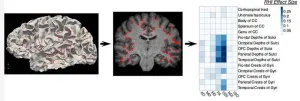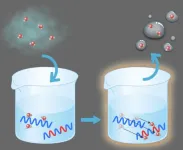(Press-News.org) By providing flexibility services to renewable energy systems, consumers can both help in balancing power grids and receive financial benefits. Hosna Khajeh’s doctoral dissertation from the University of Vaasa, Finland, introduces new methods that enable the efficient utilisation of energy users’ flexibility resources in distribution and transmission networks.
As the use of weather-dependent renewable energy sources increases, power systems need to become more flexible to guarantee energy supply at all times. One of the necessary steps for the future is making it possible for consumers to support both national and local power grids with their existing flexibility resources – such as home batteries, air conditioners, and renewable energy setups.
In her doctoral dissertation in electrical engineering, Hosna Khajeh shows how individual energy users, local energy communities, and industrial hydrogen systems can become flexibility service providers for both transmission and distribution system operators.
– While flexibility services for transmission system operators are well-developed, less attention has been given to those for distribution system operators, points out Khajeh who will defend her dissertation on 3 December at the University of Vaasa.
Khajeh states that consumers providing flexibility services not only benefits the system operators, but also the energy users themselves since they would profit financially from harnessing their own resources.
Practical methods for providing flexibility services
In her dissertation, Khajeh introduces different mathematical methods that enable consumers to improve grid stability.
– The presented methods help flexibility providers in effectively scheduling their resources, controlling their energy use based on the needs of system operators, and boosting their profits.
Distribution system operators, such as Vaasan Sähköverkko in Finland, can also utilise the findings to strengthen their networks, create new services, and make the electrical network more flexible.
Implementation requires global improvements from automation to planning
Khajeh points out that to deploy these new methods for providing flexibility services from household customers, improvements and investments are required both in Finland and globally.
– We need flexibility utilisation enabling advanced automation and telecommunication solutions, common transmission and distribution network planning and operating principles as well as market platforms and tariff solutions.
In her research, Khajeh used price and frequency data from Finnish national electricity transmission grid operator Fingrid’s open data platform, along with modified energy consumption data from Finnish households provided by Vaasan Sähkö, a Finnish electricity company.
Doctoral dissertation
Khajeh, Hosna (2024) Improving the Flexibility of Future Power Systems – Provision of Flexibility Services to the System Operators by Different Energy Resources. Acta Wasaensia 547. Doctoral dissertation. University of Vaasa.
Publication pdf
Public defence
The public examination of M.Sc. Hosna Khajeh’s doctoral dissertation, "Improving the Flexibility of Future Power Systems – Provision of Flexibility Services to the System Operators by Different Energy Resources" will take place on Tuesday, 3 December 2024 at 12 noon in the Kurtén Auditorium at the University of Vaasa.
It is possible to participate in the defence also online: https://uwasa.zoom.us/j/67318647702?pwd=Wze2aJ6ySoIAVSL0H50GJMo9efqzqy.1. The password is 031628
Professor Pertti Järventausta (Tampere University) will act as opponent and Professor Hannu Laaksonen as custos.
Further information
Hosna Khajeh, tel. +358 29 449 8688, hosna.khajeh@uwasa.fi
Hosna Khajeh was born in Iran in 1990. She earned a Master’s degree in Electrical Engineering, specialising in power system studies, from Semnan University. In 2019, Khajeh moved to Finland to pursue a doctorate at the University of Vaasa. During her doctoral studies, she contributed to several projects, including FLEXIMAR and SMART GRID 2.0, which focused on harnessing energy flexibility from various energy assets to improve future electrical grids. Currently, Khajeh works as a Data Scientist at Elisa Distributed Energy Storage.
END
Earning money while making the power grid more stable – energy consumers have a key role in supporting grid flexibility
Hosna Khajeh's doctoral dissertation from the University of Vaasa, Finland, presents innovative methods for efficiently utilising energy users' flexibility in distribution and transmission networks
2024-11-27
ELSE PRESS RELEASES FROM THIS DATE:
No ‘one size fits all’ treatment for Type 1 Diabetes, study finds
2024-11-27
Factors beyond carbohydrates have a substantial influence on blood glucose levels meaning current automated insulin delivery systems miss vital information required for glucose regulation, a new study has found.
A team of researchers from the University of Bristol analysing automated insulin delivery data from people with Type 1 Diabetes (T1D) discovered that unexpected patterns in insulin needs are just as common as well-established ones.
The study, published today in JMIRx Med aimed to identify patterns in changes of insulin needs and to analyse how frequently these occur in people with T1D who use the OpenAPS, a state-of-the-art, ...
New insights into low-temperature densification of ceria-based barrier layers for solid oxide cells
2024-11-27
Solid oxide cells (SOCs), including solid oxide fuel cells (SOFCs) and solid oxide electrolysis cells (SOECs), are among the most promising energy conversion technologies due to their high efficiency and fuel flexibility. However, the high-temperature sintering required for their manufacture often leads to undesirable reactions at the electrolyte and electrode interface, degrading cell performance. A thin, dense ceria-based barrier layer, typically composed of gadolinium-doped ceria (GDC), is widely used to prevent these reactions. Achieving sufficient densification ...
AI Safety Institute launched as Korea’s AI Research Hub
2024-11-27
The Ministry of Science and ICT (MSIT), headed by Minister Yoo Sang-im, held the launch ceremony for the "AI Safety Institute" (AISI) on Wednesday, November 27, at the Pangyo Global R&D Center.
At the "AI Seoul Summit"last May, leaders from 10 countries recognized safety as a key component of responsible AI innovation and emphasized the importance of establishing AI safety institutes and fostering global collaboration for safe AI. President Yoon Suk Yeol also expressed his commitment, stating, "We will work towards establishing an AI safety institute in Korea and actively participate ...
Air pollution linked to longer duration of long-COVID symptoms
2024-11-27
Exposure to air pollutants (PM2.5 and PM10) is associated with an increased risk of persistent long-COVID symptoms, partly due to its impact on the severity of the acute infection. This is the main conclusion of a study led by the Barcelona Institute for Global Health (ISGlobal), a centre supported by “la Caixa” Foundation, in collaboration with the Germans Trias i Pujol Research Institute (IGTP), and published in Environmental Health Perspectives.
Long-COVID is a heterogeneous condition in which symptoms like fatigue, breathlessness, and cognitive issues persist for months after ...
Soccer heading damages brain regions affected in CTE
2024-11-27
CHICAGO – Soccer heading may cause more damage to the brain than previously thought, according to a study being presented next week at the annual meeting of the Radiological Society of North America (RSNA).
Heading is a widely used technique in soccer where the players control the direction of the ball by hitting it with their head. In recent years, research has been done that suggests a link between repeated head impacts and neurodegenerative diseases, such as chronic traumatic encephalopathy (CTE).
“The potential effects of repeated head impacts in sport are ...
Autism and neural dynamic range: insights into slower, more detailed processing
2024-11-27
A new study has linked distinct neural and behavioral characteristics in autism spectrum disorder to a simple computational principle. Centered on the “dynamic range” of neurons, which reflects how gradually or sharply they respond to input, the study suggests that individuals with autism spectrum disorder have an increased dynamic range in their neuronal response, resulting in a more detailed but slower response to changes. This research defies previous descriptions of ASD as a “broken cog in the machine” and provides a deeper, richer account of the computational basis of ASD.
[Hebrew University of Jerusalem]– Researchers Dr. Yuval Hart and Oded ...
AI can predict study results better than human experts
2024-11-27
Large language models, a type of AI that analyses text, can predict the results of proposed neuroscience studies more accurately than human experts, finds a new study led by UCL (University College London) researchers.
The findings, published in Nature Human Behaviour, demonstrate that large language models (LLMs) trained on vast datasets of text can distil patterns from scientific literature, enabling them to forecast scientific outcomes with superhuman accuracy.
The researchers say this highlights ...
Brain stimulation effectiveness tied to learning ability, not age
2024-11-27
As we age, our cognitive and motor functions deteriorate, which in turn affects our independence and overall quality of life. Research efforts to ameliorate or even completely abolish this have given rise to technologies that show a lot of promise.
Among these is non-invasive brain stimulation: a term encompassing a set of techniques that can affect brain functions externally and noninvasively, without the need for surgery or implants. One such promising technique, in particular, is anodal transcranial direct current stimulation (atDCS), which uses ...
Making a difference: Efficient water harvesting from air possible
2024-11-27
Harvesting water from the air and decreasing humidity are crucial to realizing a more comfortable life for humanity. Water-adsorption polymers have been playing a key part in atmospheric water harvesting and desiccant air conditioning, but desorption so that the polymers can be efficiently reused has been an issue. Now, Osaka Metropolitan University researchers have found a way to make desorption of these polymers more efficient.
Usually, heat of around 100°C is required to desorb these polymers, but Graduate School of Engineering student Daisuke Ikegawa, Assistant Professor Arisa Fukatsu, ...
World’s most common heart valve disease linked to insulin resistance in large national study
2024-11-27
A large new population study of men over 45 indicates insulin resistance may be an important risk factor for the development of the world’s most common heart valve disease – aortic stenosis (AS).
Published today in the peer-reviewed journal Annals of Medicine, the findings are believed to be the first to highlight this previously unrecognised risk factor for the disease.
It is hoped that by demonstrating this link between AS and insulin resistance – when cells fail to respond effectively to insulin and the body makes more than necessary to maintain normal glucose ...
LAST 30 PRESS RELEASES:
Exercise and nutritional drinks can reduce the need for care in dementia
Michelson Medical Research Foundation awards $750,000 to rising immunology leaders
SfN announces Early Career Policy Ambassadors Class of 2026
Spiritual practices strongly associated with reduced risk for hazardous alcohol and drug use
Novel vaccine protects against C. diff disease and recurrence
An “electrical” circadian clock balances growth between shoots and roots
Largest study of rare skin cancer in Mexican patients shows its more complex than previously thought
Colonists dredged away Sydney’s natural oyster reefs. Now science knows how best to restore them.
Joint and independent associations of gestational diabetes and depression with childhood obesity
Spirituality and harmful or hazardous alcohol and other drug use
New plastic material could solve energy storage challenge, researchers report
Mapping protein production in brain cells yields new insights for brain disease
Exposing a hidden anchor for HIV replication
Can Europe be climate-neutral by 2050? New monitor tracks the pace of the energy transition
Major heart attack study reveals ‘survival paradox’: Frail men at higher risk of death than women despite better treatment
Medicare patients get different stroke care depending on plan, analysis reveals
Polyploidy-induced senescence may drive aging, tissue repair, and cancer risk
Study shows that treating patients with lifestyle medicine may help reduce clinician burnout
Experimental and numerical framework for acoustic streaming prediction in mid-air phased arrays
Ancestral motif enables broad DNA binding by NIN, a master regulator of rhizobial symbiosis
Macrophage immune cells need constant reminders to retain memories of prior infections
Ultra-endurance running may accelerate aging and breakdown of red blood cells
Ancient mind-body practice proven to lower blood pressure in clinical trial
SwRI to create advanced Product Lifecycle Management system for the Air Force
Natural selection operates on multiple levels, comprehensive review of scientific studies shows
Developing a national research program on liquid metals for fusion
AI-powered ECG could help guide lifelong heart monitoring for patients with repaired tetralogy of fallot
Global shark bites return to average in 2025, with a smaller proportion in the United States
Millions are unaware of heart risks that don’t start in the heart
What freezing plants in blocks of ice can tell us about the future of Svalbard’s plant communities
[Press-News.org] Earning money while making the power grid more stable – energy consumers have a key role in supporting grid flexibilityHosna Khajeh's doctoral dissertation from the University of Vaasa, Finland, presents innovative methods for efficiently utilising energy users' flexibility in distribution and transmission networks


